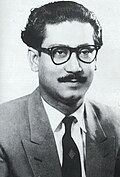Third Mujib ministry | |
|---|---|
| 3rd Council of Ministers of the People's Republic of Bangladesh | |
| 16 March 1973–25 January 1975 | |
 Prime Minister Sheikh Mujibur Rahman | |
| Date formed | 16 March 1973 |
| Date dissolved | 25 January 1975 |
| People and organisations | |
| President | Abu Sayeed Chowdhury Mohammad Mohammadullah (acting until 1974) |
| Prime Minister | Sheikh Mujibur Rahman |
| Member party | Bangladesh Awami League |
| Status in legislature | Dominant-party majority |
| Opposition party | - |
| History | |
| Election | 1973 |
| Outgoing election | - |
| Legislature terms | 1st Jatiya Sangsad |
| Predecessor | Mujib II |
| Successor | Mujib IV |
The third Mujib ministry was formed on 16 March 1973 after the Bangladesh Awami League won the first general election of sovereign and independent Bangladesh with a vast majority. [1] [2]
